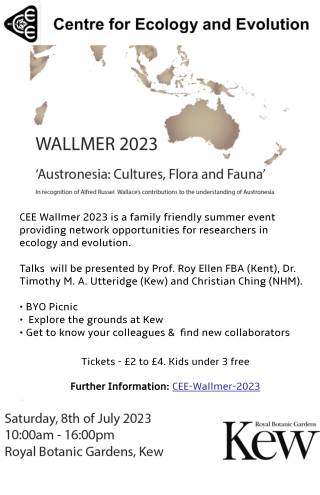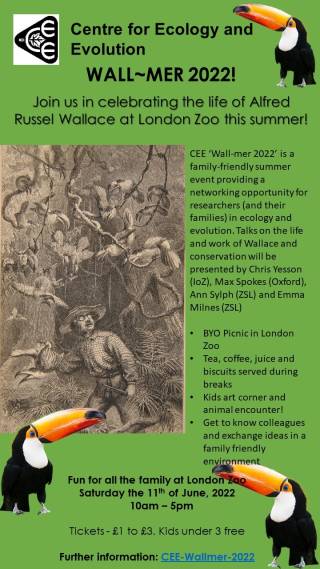Wallmer is CEE summer event at ZSL or Kew which provides researchers (and their families) an opportunity to network with others and find future collaborators within the field of ecology and evolution.
Saturday 8th July 2023 - Royal Botanic Gardens, Kew

Speakers
Christian Ching – Natural History Museum 'Southeast Asian Riparian Systems: ecology and conservation'
Dr. Timothy M.A. Utteridge – Royal Botanic Gardens, Kew 'Plant diversity across South-East Asia: revealing the plants of a mega-diverse floristic region’
Prof. Roy Ellen FBA – University of Kent 'Alfred Russel Wallace and the Anthropology of Maluku'
- Saturday 11th June 2022 - ZSL

Speakers
Dr Chris Yesson (IoZ)
'Oh I do like to be beside the seaweed'
Kelp forest are some of the most wildlife rich areas of the ocean. The shores of Sussex used to be home to a large kelp forest, but today less than 5% remains intact. In 2021 a ban on potentially damaging seabed trawling in Sussex provided nature some space to recover. The Sussex Kelp Restoration Project is monitoring the Sussex seabed and are exploring ways to promote kelp recovery. Dr Chris Yesson will talk about his work on this project and show why you too should love seaweeds.Max Spokes (Oxford University)
'Wallace the ‘one-man collecting machine’? Legacies of empire and exploitation in natural history'
I’m a final year undergraduate studying History and Politics at Balliol College, Oxford. As part of my degree, I have researched and written a dissertation entitled ‘Exploitation and Empire: Relations Between Naturalists and Locals During Zoological Expeditions in Late Empire’. My research has focused on two key zoologists and biogeographers of the 19th and 20th centuries with close links to ZSL – Alfred Russel Wallace and Evelyn Cheesman, exploring their fieldwork through a critical lens of empire and exploitation. In particular, the relationships with local people in the South and Southwest Pacific.Ann Sylph/Emma Milnes (ZSL)
Interactive experience – Wallace and Paradise
Wallace brought the first living birds of paradise to ZSL London Zoo; he arrived with them in 1862. Before their display at ZSL, it was generally thought that the birds had no legs and were continually flying. The dead specimens previously seen in Europe were prepared skins with legs removed! Linnaeus himself named these birds Paradisa apoda – footless bird of paradise. The fact they had feet was not confirmed until they were observed in the nineteenth century by Rene Primevere Lesson on a voyage of the French ship La Coquille; he also observed how the birds were prepared by local people. However, the myth about them continued until Alfred Russel Wallace reported observing them in the wild. The Lesser birds of paradise displayed at ZSL London Zoo stimulated a great interest in birds of paradise and bower birds and several beautiful, illustrated folio volumes were published describing the many species. Our interactive display will explore Wallace’s search for the birds of paradise and his communications with ZSL.
- Saturday 1st December 2018 - Royal Botanic Gardens, Kew
Speakers
Prof. Paul Barrett - NHM
Dinosaur diets – why you should always eat your greens
My major research interests are centred on the evolutionary palaeobiology of dinosaurs and
other extinct amniotes. In addition, I am involved in projects to investigate macroevolutionary
mechanisms, the evolution of Mesozoic terrestrial ecosystems and potential biases in the
fossil record. Research is concentrated in three main areas: 1. Pattern and process in
macroevolution. Controls on dinosaur diversity through time; testing of plant–dinosaur coevolutionary
scenarios; clade-clade interactions; correlated progression; influence of the rock
record, collection bias and climate on fossil reptile diversity. 2. Functional morphology,
palaeobiology and palaeoecology of herbivorous amniotes, principally sauropodomorph and
ornithischian dinosaurs. 3. Taxonomic, systematic and faunal revisions of dinosaurs and other
extinct reptiles (including lizards, plesiosaurs and ichthyosaurs)
Lee Davies – Kew
Fungi on the fringes
Fungi provide fundamental products including foods, medicines, and enzymes important
to industry. For example, they are used in the production of beer, wine, cheese, statins,
antibiotics and anti-rejection drugs for organ transplant patients. There are also possible
future uses currently under research, such as new drugs derived from fungi, a new
leather-like material and a possible alternative to polystyrene packaging.
Anna Haigh: Kew
Exploration of Aroids in Colombia
I curate all plants from the Americas, with a particular focus on curation and identification
of monocots. Research interests include Neotropical Monocots, with a particular interest
in Araceae (from all areas). I have a strong background in eTaxonomy, which includes
the Creating a Taxonomic e-Science (CATE) project, eMonocot and Neotropikey. I
managehttp://araceae.e-monocot.org/ which aims to keep up-to-date with pages for all
Araceae taxa.
Robyn Powell – Kew
The magic of Mesembs
I am based in the Cytogenetic Laboratory and measure genome size of plants and fungi
across a range of groups. I assist and train staff and students in flow cytometry and am
involved in producing data that contributes to a number of projects. I am also interested
in understanding genome size evolution in the diverse succulent plant family Aizoaceae.
James Borrell – Kew
Ensete – The False Banana
Enset is the staple food source for ~20 million people in Ethiopia. Working as part of a
collaborative team, I’m aiming to use state of the art modelling and genomic approaches
to understand the diversity of Enset landraces in cultivation as well as explore wild crop
relatives. We hope to unravel the secrets of this remarkable drought-resistant crop to
support sustainability and livelihoods in East Africa. This project involves extensive
fieldwork in Southern Ethiopia and ultimately aims to produce a multifunctional baseline
resource for present and future enset cultivation.
- 2023
-
- 2022
-
- 2020
-
- 2019
-
- 2018
-
- 2017
-
- 2016
-
- 2015
-
 Close
Close

